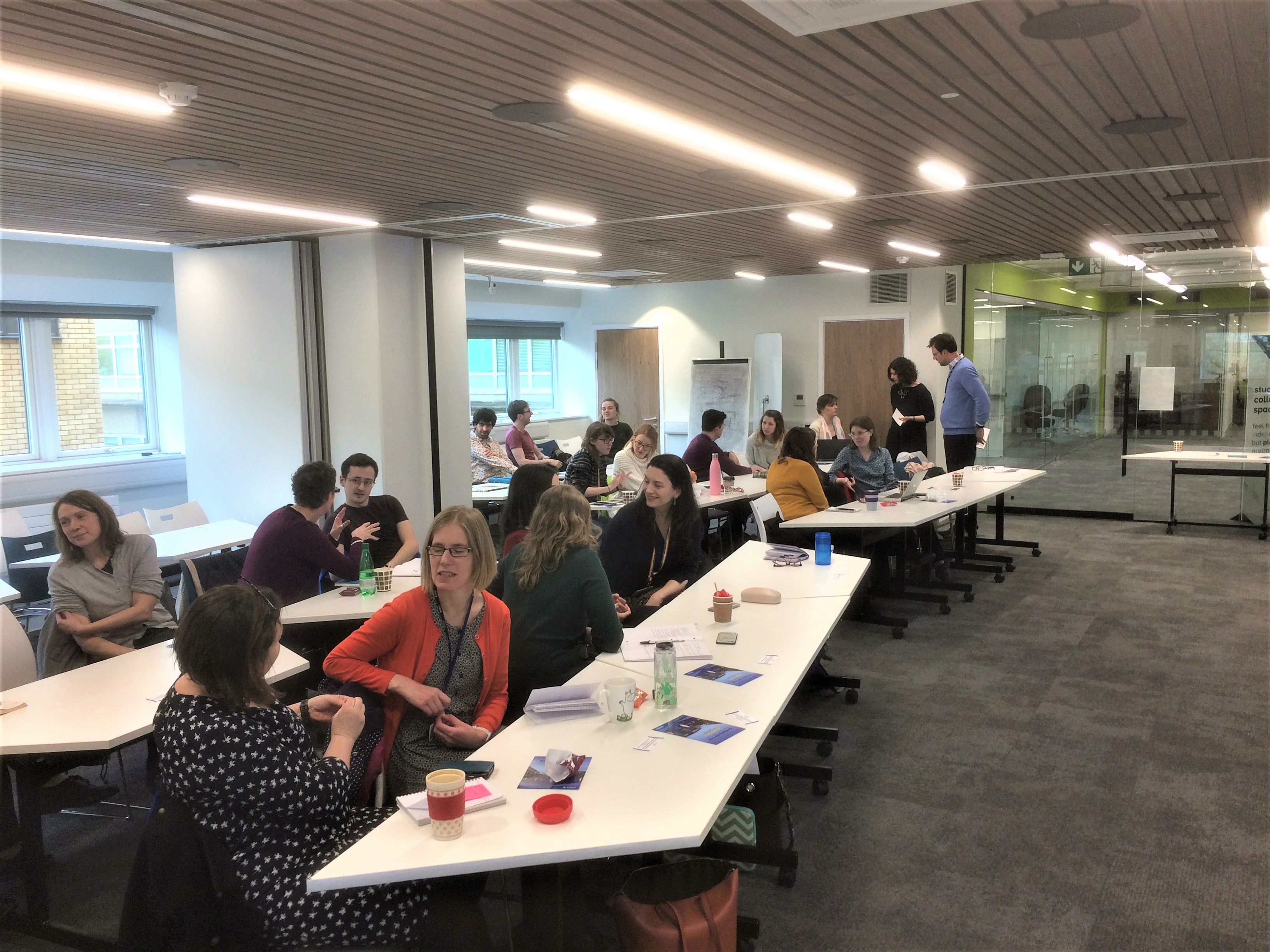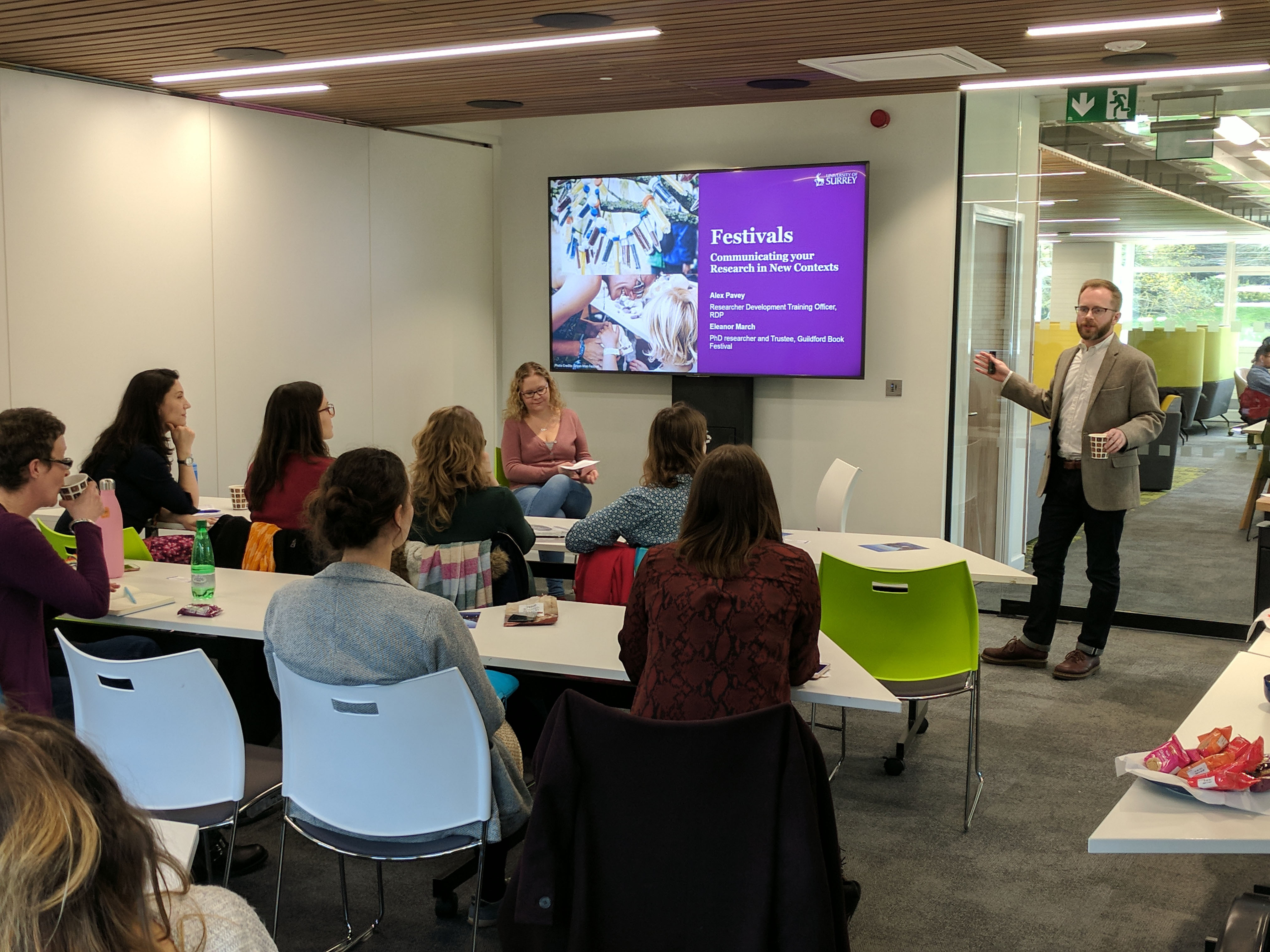Research never exists in isolation. Increasingly we are being asked to consider for whom our research is important, how we can involve the public in our findings and research methods, and how the university can be a good neighbour to its host city. We firmly believe in turning the connections between research and society into opportunities. The best academics are expert communicators who can make high-level research intelligible, including why it is relevant to the wider world.
Public Engagement is a strange term; despite being common and important in academia, not everyone has a clear idea about what it is, or how to measure it. Our objective was to help identify several different approaches to public engagement, and provide training and discussion relevant for PGRs and early career researchers.
The key strands of public engagement can be roughly captured as community, citizen-science, and communication. In other words, what is our role nationally and locally as academics and as an institution? How and why should be involve the public in our research? What are the different audiences for our work, and how can we reach them? All of these contribute to the ideal of research that welcomes public scrutiny, and is well placed to demonstrate its value.

Discussion: How would you represent your research in cake form?
On 14th March the Researcher Development Team organised a full day of Public Engagement events. The day was designed to introduce PGRs and early career researchers to what the University currently does, get people thinking about how their research could have public impact or involve the local community, and facilitate discussion about this increasingly important feature of academic careers. We were delighted that researchers from all faculties and different stages of their career took part, and that so many people were interested in the diverse aspects of the theme.
The day kicked off with a presentation from Ross Kelway and Lisa Dimbylow from the University of Surrey Public Engagement team. They reported on the many things the university is involved in, including some inspiring contributions to the local community. Daisy Shearer, current PhD, is growing a ‘physics garden’ as part of Guildford in Bloom; university research is using the data collected by local residents to measure air pollution; the ever-popular Bright Club and Pint Of Science dare researchers to turn their work in comedy and pub-chat. Ross and Lisa stress the importance of considering the University’s local community; our relationship with the town is crucial to sustaining a thriving institution, and making Guildford a welcoming place for students to live in.
Our next parallel sessions emphasised different ways of communicating with important audiences: teaching in schools and getting involved with festivals. The Brilliant Club are a charity who offer paid teaching placements to PhDs; school children who might not otherwise think about university as a viable option learn that scientists and scholars are real people, and get a taste of what further study would be like. In return, researchers can extend their skills in teaching and planning – including designing their own module, based on their own research. The Doctoral College is funding ten placements for Surrey PhDs with The Brilliant Club, and applications are currently still open.
One very effective way of explaining what we do to the public can be through stalls or demonstrations at arts, music or science festivals. We heard about Guildford Book Festival from Eleanor March, a PhD student at the University who is also a trustee of the festival, whilst Alex discussed his experiences working for Green Man Festival. These types of events offer researchers the opportunity to share their ideas in exciting, non-traditional environments. Those environments also present challenges, however – not least the potentially unpredictable weather conditions at some festivals. The session covered some practical tips for researchers considering getting involved in communicating their research at festivals, including planning interactive activities and being mindful of diverse audiences.

Alex Pavey introducing the exciting and challenging world of presenting research at festivals.
After a networking lunch, the highlight of the day was our panel discussion: “What does public engagement mean to you?” Featuring Rebecca Jones from the Wellcome Trust, Prof. Jane Ogden, Dave Ferguson, Head of Communications, Dr Hashini Thirimanne and PGR Nick Werren, this contained a wealth of angles on public engagement – from what funders are looking for to how the university can promote their researchers; from conquering public speaking nerves to recruiting for events; from managing public engagement alongside your research, to tip for creating and grasping opportunities. We heard about their diverse experiences of public engagement, and different ways we can communicate what we do, make our research relevant, and build better communities.

Our esteemed panel: (L-R) Jane Ogden, Rebecca Jones, Nick Werren, Hashini Thiraminne, Dave Ferguson (and Mike Rose hosting)
We rounded off the day with a Three Minute Thesis training session and a workshop on publishing and communicating as a public intellectual. These gave participants the opportunity to discuss how different fora of writing and speaking shape our message. What are the different routes to disseminating research, and what are your responsibilities to your audience?
Each of the sessions were designed to provide a mixture of information, discussion and reflection, encouraging researchers from all disciplines to collaborate and innovate. We are grateful for everyone who took part and asked insightful questions. It was important to think about the challenges facing researchers in this area, as well as managing the various opportunities that are available. We also hope that they day allowed everyone to re-think their conception of public engagement, and see how it connects to other important themes, such as planning, impact, publication and progression.
There has been a lot of encouragement and positive feedback about the day, and we already know about a number of new projects that have been made possible through it – including teaching placements, widening participation, and new workshops. For example, we are now putting together new resources to help researchers connect their research with policy bodies and parliament. Thank you to everyone for your suggestions and enthusiasm!
